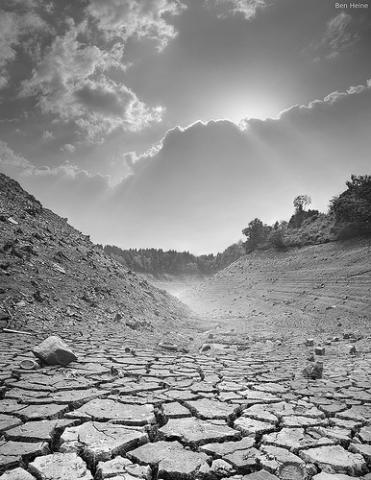It’s only early January, and already we’re witnessing what could be the most devastating climate change story of the year. A new study in Nature Geoscience this week shows that even if we go to zero emissions and completely halt our wholesale burning of fossil fuels, climate change will continue for the next 1,000 years.
If only we could take solace in saying, “I told you so” to climate change deniers and the fossil fuel lobby fighting to confuse the public about climate change. Such proclamations seem trite and trivial, however, when we’re faced with the burning reality that our dirty oil addiction is cooking the planet in an irreversible way.
The study, conducted by University of Calgary and Environment Canada’s climate centre at the University of Victoria is the first full climate model simulation to make predictions 1,000 years into the future. Dr. Shawn Marshall and his team explore the question: “What if we completely stopped using fossil fuels and put no more CO2 in the atmosphere? How long would it then take to reverse current climate change trends and will things first become worse?” Using simulations with the Canadian Earth System Model, the research team exploredzero-emissions scenarios if humans completely stop burning fossil fuels in 2010 and 2100.
The article shows, devastatingly, that climate change will continue even if we stop our use of fossil fuels immediately. We’ve had that much of an impact. With this news, Canada’s head-in-sand approach to climate issues just won’t cut it.
The study enumerates the devastating costs of rampant fossil fuel consumption: In addition to global temperatures rising by up to 5 degrees, Gillett et al suggest that warming of the intermediate-depth ocean around Antarctica could lead to the collapse of the West Antarctic Ice Sheet, which could cause a rise in sea levels of at least 4 metres. In addition, desertification in North Africa will cause drought and food shortages.
As an Oxfam study has previously demonstrated, it will be the Global South that will bear the brunt of devastating climate change impacts and costs. To understand the discrepancies between the warming patterns of the Global North and South, Gillett et al postulate that one reason is inertia of the global ocean and parts of the Southern Hemisphere. Their inertia means that warming has tended to be slower and more gradual. CO2 emissions from the last century are only causing these oceans to warm now. Worryingly, this means that we can expect warming to continue long into the future.
In the Northern Hemisphere, Canada and Russia will fare better than the South in terms of the impacts of these cataclysmic changes. Due to their geographic location, impacts will be less direct and devastating. This reality may diminish the urgency by which governments take action. The authors caution that we should not be fooled into complacency. We don’t have time to be fed lies and propaganda by the fossil fuel lobby; we must act immediately.
The irreversible way that we have impacted the climate does not demonstrate that action is futile or helpless. Quite to the contrary, the benefits of immediate action mean that we can mitigate some of these longer term consequences of climate change.
To read on about the shocking study: Ongoing Climate Change Following A Complete Cessation of Carbon Dioxide Emissions. See also the University of Calgary’s Press release: Climate Change to Continue to the Year 3000 in Best Case Scenarios.
Photo credit: Ben Heine.
Subscribe to our newsletter
Stay up to date with DeSmog news and alerts






